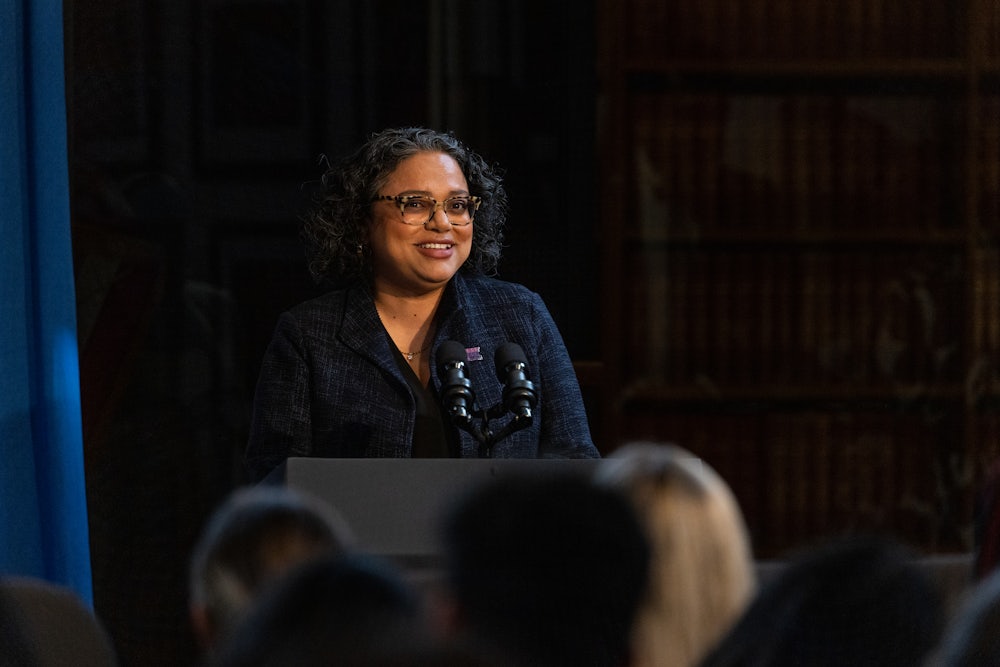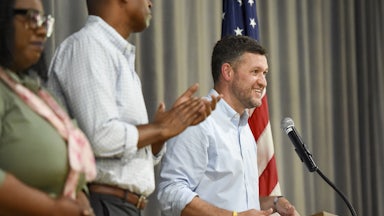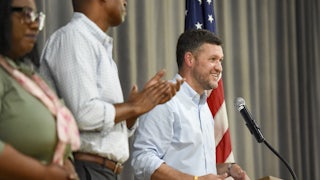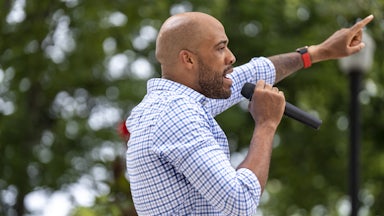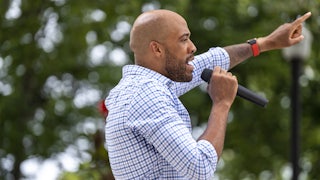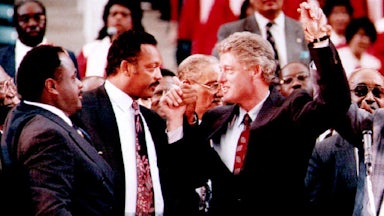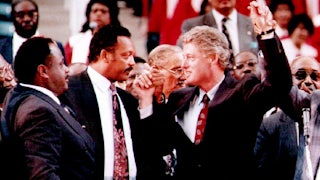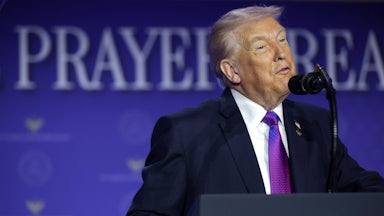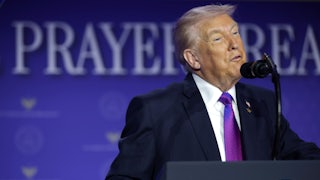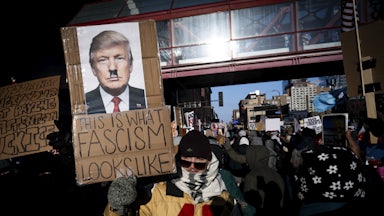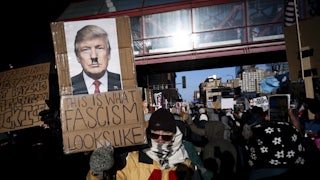Mini Timmaraju, the president of NARAL Pro-Choice America, has been putting in the days and miles on the campaign trail of late. By the time I caught up with her, she was on the third state of a lengthy swing across the Western part of the United States, campaigning for candidates who support abortion rights. We spoke at a phone bank event in Phoenix, tucked away in a side office stacked with Democratic paraphernalia.
The upcoming midterm election, and the specific salience of abortion as an issue, has been foremost on Timmaraju’s mind as Election Day grows nearer. As we were in Arizona, much of our conversation focused on the state and its tight, headline-grabbing races. But she also shouted out recent special election races across the country: Mary Peltola’s victory in Alaska and Pat Ryan’s upset win in a New York congressional district. Back in August, I wrote about how Ryan and his team geared up to make abortion rights a centerpiece in their campaign as soon as Justice Samuel Alito’s draft decision in Dobbs v. Jackson Women’s Health Organization got leaked to the press—an early acid test of the theory that the high court’s decision might galvanize voters.
This interview has been lightly edited and condensed for clarity.
We’ve seen over the past couple of weeks that polls are tightening. People are saying that the economy is going to be the top issue. Do you think that abortion is maybe losing it salience as an issue as we get further from Dobbs and closer to the election?
So I think that abortion is continuing to be an incredibly motivating issue. We know that it’s penetrated. We know that it’s polling in the topmost motivating issues, at least for Democrats but also some independents and even some Republicans. We know that in places like Kansas and the special elections in New York and in Alaska, the issue was really, really powerful. And created upsets.
I think the closer you get to the election, the further you get from Dobbs, it becomes challenging. I also think we have to be really honest about the fact that this is a midterm election and the party in power, the pro-choice Democrats, will be the most vulnerable in a midterm. I think it’s important for all of us to understand the landscape.
But I also think what we’ve seen is record voter registration, both for women and younger people. And I’ve learned the hard way not to rely too much on polls but to listen to people on the ground. And the hard data that we’re seeing on the ground is [showing] record numbers of vote by mail, applications, registration numbers. We also know polls are measured on likely voters or whatever pollsters’ concept is of a likely voter. And I’ve hired pollsters, and I’ve done polls that have been wildly different month after month. So I don’t think that abortion is losing its salience. I think elections are won on many, many issues. But I’m still extremely optimistic, because this is the first election we’ve had ever since losing a fundamental, constitutional right. We’ve never seen this happen before in the history of the country.
So it’s really hard to predict exactly how the American electorate is going to respond. The best polls are actual real elections. And that’s what we saw in Kansas and in New York and Alaska. Right. None of the polling in those races showed anything like what actually happened. So I have hope in the American people, and you know, I’m doing this road trip, and I’m meeting with organizers and activists and members on the ground in the states I’ve been in, and the energy is really high. And we’re seeing people turning out to canvass for secretaries of state and attorneys general. It’s not just governors and senators. And that’s also different.
You’re doing this whole big westward swing. Why was Arizona on the list?
First of all, you have two real very problematic abortion bans in the state. Abortion is 100 percent on the ballot here in Arizona. On the federal level, if we can’t protect Mark Kelly, we’re in for a really bad situation in the Senate. So the Senate is really critical for us. We want to protect our Senate majority and hopefully expand it, and Mark Kelly’s key to all of that. And man, the attorney general here is a real piece of work. And what [Democratic candidate] Kris Mayes could do as A.G. could be extremely powerful.
You know, what we found at NARAL is A.G.s are now really that front line of defense of enforcement. A lot of these bans don’t have enforcement mechanisms. A lot of these trigger bans especially, especially the one in Arizona, which is wild—a territorial ban from prior to Arizona even being a state. Who’s enforcing that, who’s not enforcing that? It’s A.G.s. So Kris is fantastic, and we’re super excited to be working for her.
And then Katie [Hobbs], obviously—look, you have an extremist, MAGA Republican insurrectionist wannabe Trumper who has been on the record calling women who have abortions “murderers.” So even if Arizona wasn’t a critical state for the map, it has become incredibly critical now because we have a very, very dangerous person running for governor with a real shot because Arizona is a tough state. So all of those reasons combined, plus we’ve had an active NARAL chapter membership; 75,000 members of the state for quite some time. We prioritized Arizona quite many cycles ago. So that made it a priority for us as well.
But what I will say about that, about why Arizona: To be clear, we don’t think we’re winning back, we’re not restoring Roe, if you will, in one election cycle. This is a decades-long fight. So what we’re really trying to do is build true political power in really tough places, with an eye to the long game.… And we’re going to continue to expand our map, but we’re going to continue to fight really hard in places like Arizona because we know both for the national electoral landscape but also for the geography and where we are in the country, it’s going to be so important.
Speaking of the long game and of these state races, do you think that there may be more attention paid to state legislatures?
I hope so. I hope so! When I talk to donors, when I talk to activists, and they ask me about certain states, we know that state legislatures are gonna be critical. We have a long way to go. But we’ve got some states where the margins are pretty tight, like the North Carolina Senate, the Pennsylvania House. These are two examples of where if we could flip or hold, or if we fail to hold, we could have really serious abortion bans ricocheting through those legislatures. So it’s not enough just to elect a governor or an A.G., you really need up and down the ticket to protect reproductive rights. And we’ve seen so much problematic gerrymandering and so [many] other attacks on the integrity of legislatures, that really it’s incumbent on us to be, again, like I said, rebuilding that old-school political power, increasing our numbers in the state of members, making sure voters are identifying as reproductive freedom voters.
So this is the cycle to raise awareness of those issues, and to really have a chance to explain to citizens in these states the value of a state rep; the value of a state senator. It’s an opportunity for us to do a lot of civic education.
I did want to ask you a little bit about what you are seeing on the ground, just generally, as you’re doing this swing. Are you feeling that enthusiasm like this is really an issue that’s going to be motivating people?
I mean, we’re seeing a lot of positive energy from our members and our activists, which is good because that’s the first step. For us, our goal is to move a NARAL member. And that’s somebody who took an action for NARAL; they clicked on a link, they made a contribution, they showed up for a phone bank. You can move them up the ladder of engagement. That’s a really great sign for enthusiasm. We surpassed our membership number, historically, this year. We’re at four million members. We’ve never had that many members before. So that means that many people in the country who took a new action to support reproductive rights. And now here in the states and on the doors, we can measure it by how many people turn out for events like this on a weeknight to do a phone bank in a suburb.
I think we’re about to see a lot more of this activity. The numbers we’re seeing in turnout for volunteer events are similar to what we would see in a presidential year, not a midterm. So that makes me optimistic. And the same with the fundraising. We’ve raised a record amount of money for our campaign operation this year. It’s the kind of money we’ve raised in a presidential year.
So I think there’s a lot of indicators for enthusiasm. But look, I think at the end of the day, it comes down to how effectively candidates can make the connection between their races and abortion, right? It’s a little different for a ballot initiative than a candidate.
I will praise Pat Ryan. I think he did such a good job of connecting his candidacy to the message. I think so many candidates are doing great work right now. But ultimately, it’s going to come down to their authenticity. How credible they are. How well they’re able to connect to their voters around this issue. Some of them are better. His ads are phenomenal. I talked to him shortly after the race. And he said something sort of self-deprecating, like, “I know I’m not the ideal spokesperson for this issue.” And I actually was like, “You are, because you’re a veteran. You care deeply about our country. You have impeccable credentials around the concept of freedom.” And that’s what’s resonating with America.
And we need to see more men in the arena, and he did it so authentically, like as a dad, but also just as a soldier. “I fought for these fundamental freedoms, and I’m going to fight for your freedom” is an incredibly powerful frame. But it worked because he’s authentic. And he connected well with the voters. So I think the other factors still remain. I’ve worked on campaigns my whole career. I’m a former campaign operative, worked on Hillary, so I’ve seen the highs and lows. Anytime you pin everything on like one issue, it could create challenges for those who advocate around the issue.
I think there is a tendency among the media to say, “This is going to be the abortion election; going to be the economy election.”
Right. We know American voters aren’t that simple. We vote on a multitude of issues. I’m glad you didn’t ask this question, but I’ve had other reporters ask me: “Well, is abortion gonna be more important the economy?” And as women we laugh, because I’m like, “I’m sorry, my ability if and when and how to have a child is intrinsically connected to the economy and my economic needs, right?” I mean, there’s a childcare crisis right now in this country. There was a baby formula shortage. We’re still fighting for equal pay and a host of other lack of investments and family infrastructure. So if you’re gonna force me to have forced birth, that’s gonna have an economic impact on my life. Yeah. So it’s not a big leap to say reproductive freedom is an economic issue for a lot of American women, but also men. We’re seeing more and more men say, “This impacts my life, too. This impacts my choices as well. And I want to have absolute control over that. I don’t want government interference.”
